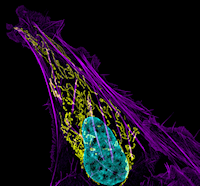Busting the Cure Balloon and Finding a Workable Solution

“The cure cannot come soon enough.”
As someone who works in healthcare, and who speaks to patients and their loved ones every day, this is a statement I hear frequently. Whether we’re talking about someone’s cancer diagnosis, or Alzheimer’s Disease, or ALS, or MS, or diabetes… it seems to be everyone’s hope – that a cure is on the horizon.
When my father was alive, and in his 24th year after his prostate cancer diagnosis, he lamented the fact that he had exhausted all his treatment options and that nothing else was going to keep his cancer in check. “I just need to stay alive long enough for them to figure out the cure!” he told me.
I kept my mouth shut. Because…
I hate to be the bearer of bad news, but in today’s healthcare environment, the idea of a CURE, for most diseases and maladies, is just plain fantasy. Not gonna happen. (And Dad would have felt like I had busted his balloon.)
Why not?
Because – as cynical as this sounds (and is) – it’s because curing someone of whatever their disease is means no more money can be made from them.
Let me repeat that – and put it into other words – follow the money! The very businesses that tell you they are seeking cures – AREN’T. Because if they cure you, then you are no longer the cash cow you’ve been.
As I said – cynical. But when you think about it for a moment – you know it’s true.
There are other “cure” related concepts that are ridiculous. One is that “someday there will be a cure for cancer” – which is like saying “someday all politicians will agree.”

Oh come on!! In effect, “cancer” is dozens (hundreds?) of different diseases! They may all – mechanically – work in similar ways, as zombie, dividing, invasive cells. But they will all require different treatments employing many different approaches; not just one treatment for “cancer.”
Even pain can’t be cured. It can be reduced through management using drug and physical therapies. Medical science, and the drug, biologic, and device companies, are all about helping you MANAGE your pain. They would love for you to become dependent on their products – because, of course, they can make a fortune from that.
OK. Now that I’ve popped your fantasy balloon of finding a “cure” – what’s next? What CAN we hope for?
Management – Manage Your Disease or Condition
We can hope for a way to manage diseases and conditions that will alleviate symptoms, keep us from getting worse, and that will bring back whatever function we might lose as we’re trying to understand our new health realities.
Why is management possible if a cure isn’t? Because management of a disease or condition is very lucrative – and is therefore available. Those businesses that develop treatments can continue to make money from them for a very long time.
Management makes a disease “chronic” instead of “life ending.” It takes place through drug therapies, or chemical therapies (two names for pretty much the same thing), radiation, surgery, implantations, transplants…. When combined with lifestyle changes, or other forms of therapy (physical, psychotherapy, occupational, others), you may even be able to manage your disease or condition so you don’t have to think much about it.
As a patient, or loved one of a patient, it becomes incumbent upon us to seek the right kinds of care to help us MANAGE a diagnosis most effectively and efficiently. With a goal of management, instead of expecting a cure, we can move forward with a better quality of life.

Unfortunately, very few of us have the ability to figure out the best course for ourselves. (No one ever teaches us to be smart patients)… which is why, when the symptoms and management get at all challenging, it’s time to find a patient advocate to help.
An apology to you, my reader, for asking you to slog through one of the most cynical, and possibly depressing, posts you’ve ever read about the healthcare system….
I do hope you can appreciate the point being made as a way to help you manage your own expectations. Unlike my dad, who went to his grave thinking a “cure” for his prostate was around the corner, and who made difficult and painful choices in pursuit of that cure, I hope you are able to make better choices for yourself, leading to an increased quality of your life through management.
Find a Health / Patient Advocate or Navigator
Learn more about AdvoConnection and The Alliance of Professional Health Advocates
